An Extraordinary & Historically Important.
GROUP OF TEN
Order of The British Empire (Civil) 1946
Imperial Service Order (QEII), 1958
War & Victory pair, & Territorial War Medals (1914-1918)
Defence & Coronation Medals 1937 & 1953,
with Territorial Force Efficiency Medal (GV)
& Special Constabulary Medal (GV).
367. A.W.O. CL. 1 F.J. HERITAGE.
-(Served in The Siberian Intervention 1918-1920)-
1/9th (Cyclist Bn) HAMPSHIRE Regt.
The British Military Mission (Siberian Allied Intervention Force)was seconded to the Canadian Expeditionary Force at VLADIVOSTOK,RUSSIA,in 1918.
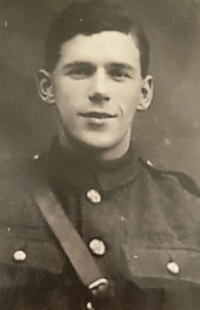
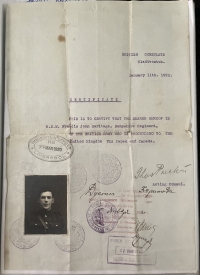
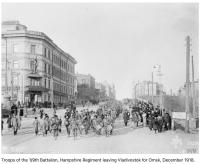
 [THE TEN MEDALS]
ORDER of THE BRITISH EMPIRE (GVI) L.G. 9th January 1946.
“Private Secretary to First Parliamentary Council”
[THE TEN MEDALS]
ORDER of THE BRITISH EMPIRE (GVI) L.G. 9th January 1946.
“Private Secretary to First Parliamentary Council”
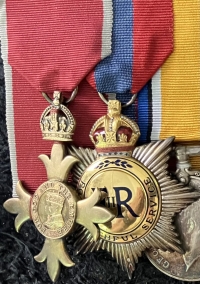 IMPERIAL SERVICE ORDER (EIIR)L.G. 12th June 1958.
“Private Secretary to First Parliamentary Council”
War & Victory Medals. (Officially Impressed)
367. A.W.O. CL. 1 F.J. HERITAGE. HAMPS. R.
Territorial Force War Medal (Officially Impressed)
CPL F.J. HERITAGE. HAMPS. R.
Defence Medal 1939-45 (GVI) unnamed as issued.
(Probably for service as Special Constabulary Inspector in WW2)
Coronation Medal 1937 (GVI) unnamed as issued.
Coronation Medal 1953 (EIIR) unnamed as issued.
Territorial Force Efficiency Medal (GV) (Officially Impressed)
355196 Cpl. A.S.S. Mjr. F.J. HERITAGE. 9 / HAMPS: R.
Police Special Constabulary Medal (GV) (Officially Impressed)
INSPR. FRANCIS J. HERITAGE.
IMPERIAL SERVICE ORDER (EIIR)L.G. 12th June 1958.
“Private Secretary to First Parliamentary Council”
War & Victory Medals. (Officially Impressed)
367. A.W.O. CL. 1 F.J. HERITAGE. HAMPS. R.
Territorial Force War Medal (Officially Impressed)
CPL F.J. HERITAGE. HAMPS. R.
Defence Medal 1939-45 (GVI) unnamed as issued.
(Probably for service as Special Constabulary Inspector in WW2)
Coronation Medal 1937 (GVI) unnamed as issued.
Coronation Medal 1953 (EIIR) unnamed as issued.
Territorial Force Efficiency Medal (GV) (Officially Impressed)
355196 Cpl. A.S.S. Mjr. F.J. HERITAGE. 9 / HAMPS: R.
Police Special Constabulary Medal (GV) (Officially Impressed)
INSPR. FRANCIS J. HERITAGE.

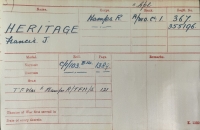 [FRANCIS J. HERITAGE] 1893-
Francis John Heritage was born in 1893 at Portland, Dorset to John and Rebecca Heritage. Father John was a Prison Officer at The Verne Citadel Prison, Portland. Francis had one sister and four brothers.
He is shown on the 1911 census working as an 18 year old Clerk in a Surveyors office. He was married at age 27 to Elizabeth Mary Langdon, 22, on 4th September 1920 at St. Peter’s church in Portland, by which time his father was shown as “Principle Warder, H.M. Prison”.
Between his time as a clerk on 1911 & his marriage in 1920 Francis had a somewhat unusual military career in that with the 1/9th Hampshire Regiment he formed part of the British Military Mission (Siberian Allied Intervention Force) which in 1918 was seconded to the Canadian Expeditionary Force at VLADIVOSTOK (Siberia) in support of the White Russian forces.
After the Great War Francis is seen serving as an Inspector of Police in the Special Constabulary, a position which he clearly continued into WW2. At some point he then moved into the civil service with a position at The Treasury and later served as Private Secretary to First Parliamentary Council for which he first received an MBE followed by an OBE, and later a seldom seen (I.S.O.) Imperial Service Order (EIIR) upon his retirement in 1958.
1/9th (Cyclist) Battalion, Hampshire Regt.
August 1914 : in Southampton.
November 1915 : joined with three other Cyclist Battalions and converted to infantry. This ‘Brigade’ was originally intended for East Africa.
4 February 1916 : sailed from Devonport to India.
October 1918, moved to Vladivostock (arriving 28 November)
and on into Siberia, where it stayed until November 1919
Thence returning to England.
It was at Omsk (at 7 January 1919) and Ekaterinberg (from May 1919).
[FRANCIS J. HERITAGE] 1893-
Francis John Heritage was born in 1893 at Portland, Dorset to John and Rebecca Heritage. Father John was a Prison Officer at The Verne Citadel Prison, Portland. Francis had one sister and four brothers.
He is shown on the 1911 census working as an 18 year old Clerk in a Surveyors office. He was married at age 27 to Elizabeth Mary Langdon, 22, on 4th September 1920 at St. Peter’s church in Portland, by which time his father was shown as “Principle Warder, H.M. Prison”.
Between his time as a clerk on 1911 & his marriage in 1920 Francis had a somewhat unusual military career in that with the 1/9th Hampshire Regiment he formed part of the British Military Mission (Siberian Allied Intervention Force) which in 1918 was seconded to the Canadian Expeditionary Force at VLADIVOSTOK (Siberia) in support of the White Russian forces.
After the Great War Francis is seen serving as an Inspector of Police in the Special Constabulary, a position which he clearly continued into WW2. At some point he then moved into the civil service with a position at The Treasury and later served as Private Secretary to First Parliamentary Council for which he first received an MBE followed by an OBE, and later a seldom seen (I.S.O.) Imperial Service Order (EIIR) upon his retirement in 1958.
1/9th (Cyclist) Battalion, Hampshire Regt.
August 1914 : in Southampton.
November 1915 : joined with three other Cyclist Battalions and converted to infantry. This ‘Brigade’ was originally intended for East Africa.
4 February 1916 : sailed from Devonport to India.
October 1918, moved to Vladivostock (arriving 28 November)
and on into Siberia, where it stayed until November 1919
Thence returning to England.
It was at Omsk (at 7 January 1919) and Ekaterinberg (from May 1919).
 The major part of the battalion sailed from Vladivostock on 1st November 1919 and returned home to the UK via Canada.
5 December 1919: arrived at Southampton and then disbanded.
[NOTE] A few members of the unit, including W.O. Heritage, obviously remained after the departure of the main battalion. Francis Heritage didn’t in fact leave Siberia until 17th January 1920 with a routing back to England via Japan & Canada.
He arrived in Liverpool on 7th March 1920.
The major part of the battalion sailed from Vladivostock on 1st November 1919 and returned home to the UK via Canada.
5 December 1919: arrived at Southampton and then disbanded.
[NOTE] A few members of the unit, including W.O. Heritage, obviously remained after the departure of the main battalion. Francis Heritage didn’t in fact leave Siberia until 17th January 1920 with a routing back to England via Japan & Canada.
He arrived in Liverpool on 7th March 1920.

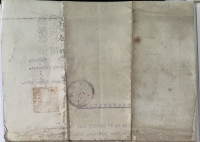 Incredibly, his Original Official Travel Certificate has survived.
It was issued in an emergency by the British Consulate in Vladivostok, on 11th January 1920 and stamped “out” by the Russian authorities on 17th January 1920. This document carries his name with a uniformed photograph and his routing details back home, which were, “Japan-Canada-United Kingdom”
This document acted as an Emergency Passport and as such it carries several official entry and exit stamps including the Russian exit stamp dated 17th January 1920, the Japanese transit stamp with written date details in Japanese, and the Liverpool UK Immigration arrival stamp of 7th March 1920…..a travel period of 49 days.
In our opinion this emergency transit document is almost certainly a uniquely surviving example and we’ve never seen or heard of another example.
Incredibly, his Original Official Travel Certificate has survived.
It was issued in an emergency by the British Consulate in Vladivostok, on 11th January 1920 and stamped “out” by the Russian authorities on 17th January 1920. This document carries his name with a uniformed photograph and his routing details back home, which were, “Japan-Canada-United Kingdom”
This document acted as an Emergency Passport and as such it carries several official entry and exit stamps including the Russian exit stamp dated 17th January 1920, the Japanese transit stamp with written date details in Japanese, and the Liverpool UK Immigration arrival stamp of 7th March 1920…..a travel period of 49 days.
In our opinion this emergency transit document is almost certainly a uniquely surviving example and we’ve never seen or heard of another example.




 [SUMMARY] An Important Group of Ten
Without any doubt this is a totally unique group of ten with an exceptionally unusual selection & combination of awards to a man who served in a very seldom seen unit, 1st / 9th (Cyclist’s) Battalion, The Hampshire Regiment.
This unit took part in the then critically important “Russian Siberian Intervention” of 1918-1920 based in Vladivostok.
[SUMMARY] An Important Group of Ten
Without any doubt this is a totally unique group of ten with an exceptionally unusual selection & combination of awards to a man who served in a very seldom seen unit, 1st / 9th (Cyclist’s) Battalion, The Hampshire Regiment.
This unit took part in the then critically important “Russian Siberian Intervention” of 1918-1920 based in Vladivostok.
 Francis Heritage also later enjoyed a senior position as an Inspector of Police Special Constabulary in the interwar and WW2 period. He had an ongoing post WW2 career in H.M.Treasury and as a senior Private Secretary in Parliament with the British civil service.
Currently Researching (Price on Request)*Serious enquiries by telephone only please.
01342-870960 or 07837-621144
Francis Heritage also later enjoyed a senior position as an Inspector of Police Special Constabulary in the interwar and WW2 period. He had an ongoing post WW2 career in H.M.Treasury and as a senior Private Secretary in Parliament with the British civil service.
Currently Researching (Price on Request)*Serious enquiries by telephone only please.
01342-870960 or 07837-621144



 [THE TEN MEDALS]
ORDER of THE BRITISH EMPIRE (GVI) L.G. 9th January 1946.
“Private Secretary to First Parliamentary Council”
[THE TEN MEDALS]
ORDER of THE BRITISH EMPIRE (GVI) L.G. 9th January 1946.
“Private Secretary to First Parliamentary Council”
 IMPERIAL SERVICE ORDER (EIIR)L.G. 12th June 1958.
“Private Secretary to First Parliamentary Council”
War & Victory Medals. (Officially Impressed)
367. A.W.O. CL. 1 F.J. HERITAGE. HAMPS. R.
Territorial Force War Medal (Officially Impressed)
CPL F.J. HERITAGE. HAMPS. R.
Defence Medal 1939-45 (GVI) unnamed as issued.
(Probably for service as Special Constabulary Inspector in WW2)
Coronation Medal 1937 (GVI) unnamed as issued.
Coronation Medal 1953 (EIIR) unnamed as issued.
Territorial Force Efficiency Medal (GV) (Officially Impressed)
355196 Cpl. A.S.S. Mjr. F.J. HERITAGE. 9 / HAMPS: R.
Police Special Constabulary Medal (GV) (Officially Impressed)
INSPR. FRANCIS J. HERITAGE.
IMPERIAL SERVICE ORDER (EIIR)L.G. 12th June 1958.
“Private Secretary to First Parliamentary Council”
War & Victory Medals. (Officially Impressed)
367. A.W.O. CL. 1 F.J. HERITAGE. HAMPS. R.
Territorial Force War Medal (Officially Impressed)
CPL F.J. HERITAGE. HAMPS. R.
Defence Medal 1939-45 (GVI) unnamed as issued.
(Probably for service as Special Constabulary Inspector in WW2)
Coronation Medal 1937 (GVI) unnamed as issued.
Coronation Medal 1953 (EIIR) unnamed as issued.
Territorial Force Efficiency Medal (GV) (Officially Impressed)
355196 Cpl. A.S.S. Mjr. F.J. HERITAGE. 9 / HAMPS: R.
Police Special Constabulary Medal (GV) (Officially Impressed)
INSPR. FRANCIS J. HERITAGE.

 [FRANCIS J. HERITAGE] 1893-
Francis John Heritage was born in 1893 at Portland, Dorset to John and Rebecca Heritage. Father John was a Prison Officer at The Verne Citadel Prison, Portland. Francis had one sister and four brothers.
He is shown on the 1911 census working as an 18 year old Clerk in a Surveyors office. He was married at age 27 to Elizabeth Mary Langdon, 22, on 4th September 1920 at St. Peter’s church in Portland, by which time his father was shown as “Principle Warder, H.M. Prison”.
Between his time as a clerk on 1911 & his marriage in 1920 Francis had a somewhat unusual military career in that with the 1/9th Hampshire Regiment he formed part of the British Military Mission (Siberian Allied Intervention Force) which in 1918 was seconded to the Canadian Expeditionary Force at VLADIVOSTOK (Siberia) in support of the White Russian forces.
After the Great War Francis is seen serving as an Inspector of Police in the Special Constabulary, a position which he clearly continued into WW2. At some point he then moved into the civil service with a position at The Treasury and later served as Private Secretary to First Parliamentary Council for which he first received an MBE followed by an OBE, and later a seldom seen (I.S.O.) Imperial Service Order (EIIR) upon his retirement in 1958.
1/9th (Cyclist) Battalion, Hampshire Regt.
August 1914 : in Southampton.
November 1915 : joined with three other Cyclist Battalions and converted to infantry. This ‘Brigade’ was originally intended for East Africa.
4 February 1916 : sailed from Devonport to India.
October 1918, moved to Vladivostock (arriving 28 November)
and on into Siberia, where it stayed until November 1919
Thence returning to England.
It was at Omsk (at 7 January 1919) and Ekaterinberg (from May 1919).
[FRANCIS J. HERITAGE] 1893-
Francis John Heritage was born in 1893 at Portland, Dorset to John and Rebecca Heritage. Father John was a Prison Officer at The Verne Citadel Prison, Portland. Francis had one sister and four brothers.
He is shown on the 1911 census working as an 18 year old Clerk in a Surveyors office. He was married at age 27 to Elizabeth Mary Langdon, 22, on 4th September 1920 at St. Peter’s church in Portland, by which time his father was shown as “Principle Warder, H.M. Prison”.
Between his time as a clerk on 1911 & his marriage in 1920 Francis had a somewhat unusual military career in that with the 1/9th Hampshire Regiment he formed part of the British Military Mission (Siberian Allied Intervention Force) which in 1918 was seconded to the Canadian Expeditionary Force at VLADIVOSTOK (Siberia) in support of the White Russian forces.
After the Great War Francis is seen serving as an Inspector of Police in the Special Constabulary, a position which he clearly continued into WW2. At some point he then moved into the civil service with a position at The Treasury and later served as Private Secretary to First Parliamentary Council for which he first received an MBE followed by an OBE, and later a seldom seen (I.S.O.) Imperial Service Order (EIIR) upon his retirement in 1958.
1/9th (Cyclist) Battalion, Hampshire Regt.
August 1914 : in Southampton.
November 1915 : joined with three other Cyclist Battalions and converted to infantry. This ‘Brigade’ was originally intended for East Africa.
4 February 1916 : sailed from Devonport to India.
October 1918, moved to Vladivostock (arriving 28 November)
and on into Siberia, where it stayed until November 1919
Thence returning to England.
It was at Omsk (at 7 January 1919) and Ekaterinberg (from May 1919).
 The major part of the battalion sailed from Vladivostock on 1st November 1919 and returned home to the UK via Canada.
5 December 1919: arrived at Southampton and then disbanded.
[NOTE] A few members of the unit, including W.O. Heritage, obviously remained after the departure of the main battalion. Francis Heritage didn’t in fact leave Siberia until 17th January 1920 with a routing back to England via Japan & Canada.
He arrived in Liverpool on 7th March 1920.
The major part of the battalion sailed from Vladivostock on 1st November 1919 and returned home to the UK via Canada.
5 December 1919: arrived at Southampton and then disbanded.
[NOTE] A few members of the unit, including W.O. Heritage, obviously remained after the departure of the main battalion. Francis Heritage didn’t in fact leave Siberia until 17th January 1920 with a routing back to England via Japan & Canada.
He arrived in Liverpool on 7th March 1920.

 Incredibly, his Original Official Travel Certificate has survived.
It was issued in an emergency by the British Consulate in Vladivostok, on 11th January 1920 and stamped “out” by the Russian authorities on 17th January 1920. This document carries his name with a uniformed photograph and his routing details back home, which were, “Japan-Canada-United Kingdom”
This document acted as an Emergency Passport and as such it carries several official entry and exit stamps including the Russian exit stamp dated 17th January 1920, the Japanese transit stamp with written date details in Japanese, and the Liverpool UK Immigration arrival stamp of 7th March 1920…..a travel period of 49 days.
In our opinion this emergency transit document is almost certainly a uniquely surviving example and we’ve never seen or heard of another example.
Incredibly, his Original Official Travel Certificate has survived.
It was issued in an emergency by the British Consulate in Vladivostok, on 11th January 1920 and stamped “out” by the Russian authorities on 17th January 1920. This document carries his name with a uniformed photograph and his routing details back home, which were, “Japan-Canada-United Kingdom”
This document acted as an Emergency Passport and as such it carries several official entry and exit stamps including the Russian exit stamp dated 17th January 1920, the Japanese transit stamp with written date details in Japanese, and the Liverpool UK Immigration arrival stamp of 7th March 1920…..a travel period of 49 days.
In our opinion this emergency transit document is almost certainly a uniquely surviving example and we’ve never seen or heard of another example.




 [SUMMARY] An Important Group of Ten
Without any doubt this is a totally unique group of ten with an exceptionally unusual selection & combination of awards to a man who served in a very seldom seen unit, 1st / 9th (Cyclist’s) Battalion, The Hampshire Regiment.
This unit took part in the then critically important “Russian Siberian Intervention” of 1918-1920 based in Vladivostok.
[SUMMARY] An Important Group of Ten
Without any doubt this is a totally unique group of ten with an exceptionally unusual selection & combination of awards to a man who served in a very seldom seen unit, 1st / 9th (Cyclist’s) Battalion, The Hampshire Regiment.
This unit took part in the then critically important “Russian Siberian Intervention” of 1918-1920 based in Vladivostok.
 Francis Heritage also later enjoyed a senior position as an Inspector of Police Special Constabulary in the interwar and WW2 period. He had an ongoing post WW2 career in H.M.Treasury and as a senior Private Secretary in Parliament with the British civil service.
Currently Researching (Price on Request)*Serious enquiries by telephone only please.
01342-870960 or 07837-621144
Francis Heritage also later enjoyed a senior position as an Inspector of Police Special Constabulary in the interwar and WW2 period. He had an ongoing post WW2 career in H.M.Treasury and as a senior Private Secretary in Parliament with the British civil service.
Currently Researching (Price on Request)*Serious enquiries by telephone only please.
01342-870960 or 07837-621144